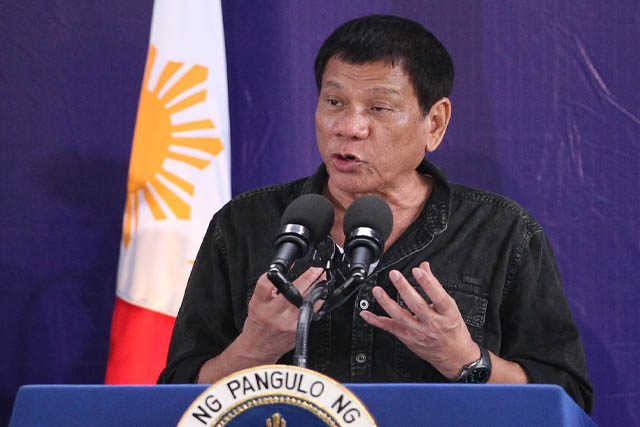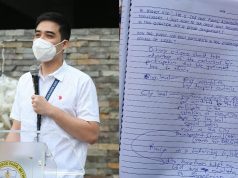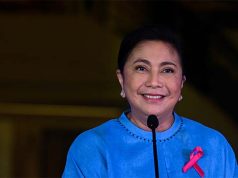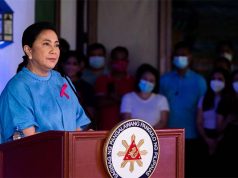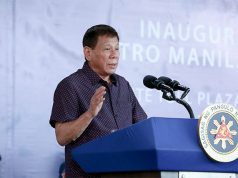Nearly a year in office, President Duterte continues to confound.
After he arrived from Russia, the President said that “Russia is a true friend.” The question is: why, how, is Russia a “true friend?”
There is absolutely no significant history that existed or exists between the Philippines and Russia, such as a highly preferred status given to the Philippines in terms of export, trade and commerce or even a mutual security arrangement beneficial to both.
Common wisdom dictates that before a country can be considered a “true friend,” there must have been some prior or prevailing shared experience between them that has meaningfully further uplifted their good relationship. For example: a shared history of trials and triumphs, a unique kind of cooperation incomparable with any other country, and/or a consistent pattern of mutual assistance preserved throughout the years.
Is this true-friend-pronouncement anchored on the “pledges” Russia promised? But we must remember that the measure of effectivity of these financial promises is the degree of foreign direct investment (FDI) actually flowing into the country. Are the massive Russian FDI’s already here? Or is this most-favorable attribution to Russia a result of President Putin being the idol of President Duterte? If so, is gut-feel the new paradigm in Philippine foreign relations?
Also, in his statement regarding the Marawi crisis, he said: “You know, I have always maintained that my duty, my sacred duty to preserve and defend the Filipino does not emanate from any constitutional restriction.”
But, as a lawyer, he should know that his authority as President has been vested by the people. The Chief Executive’s powers are only those specified or clearly inferred from the Constitution drawn up by the Filipino people he serves. The President cannot go against the Filipino people. Neither can he go beyond or against these constitutional restrictions. Just like any other citizen of the Republic, the President cannot be above the law. The rule of law must prevail.
For instance, in the absence of rebellion or invasion, when public safety requires, President Duterte cannot impose martial law on his own belief that the nation is in dire peril. He has no authority even as the highest officer of the land to do so. However, he can call on the Armed Forces of the Philippines and the Philippine National Police and give strong directives to quash the culprits and bring them to justice — a lesser remedy but which, under the circumstances, may be equally effective.
President Duterte’s 16,000,000, more or less, plurality (not majority) votes in the May 2016 election can never justify unconstitutional choices and orders. It does not give the President the license to evade and disregard the rule of law.
Also, regarding the Marawi crisis, President Duterte said: “It is in my oath of office. I beg to disagree with anyone. In this oath of office … I promised to God and to the people that I will protect and defend the country.”
But the President should be reminded that he campaigned under the mandate of the 1987 Freedom Constitution. Without it, he would not have been the President. When he took the oath of office as President, he solemnly swore that he will “faithfully and conscientiously” “preserve and defend the Constitution, execute its laws, do justice to every man.” Defending the Constitution means observing strictly presidential duties and limitations so that no abuse can occur. The President is not a ruler. He is not king. Sovereignly does not reside in the President. It resides in the people.
So, if the Supreme Court rules that the Martial law declaration is so expansive as to be considered a grave abuse of discretion by the President and orders that such declaration either be narrowed down or be rescinded all together, President Duterte has no choice but to follow such a ruling. That is the command of the Constitution. Decisions of the Supreme Court are considered part of the law of the land which the President is mandated to “faithfully and conscientiously” execute.
Recently, in President Duterte’s meeting on May 26, 2017 with soldiers of the Second Mechanized Brigade of the Philippine Army in Iligan City, he jokingly said that, in the implementation of Martial Law, “kung maka-rape ka ng tatlo, aminin ko na akin ‘yun.” This is a very bad joke.
Soldiers must be reminded that under Section 7(1)(g) of the International Criminal Court (ICC) Statute of which the Philippines is a state-party, RAPE committed during armed-conflict is a crime against humanity. Soldiers must not commit rape during war or at any time. They should be advised not to listen to this kind of talk, whether uttered seriously or by way of a jest.
This distasteful remark has only generated comments like: what is the matter with this man joking about RAPE during conflict? How can the President go so low in his attitude toward women, especially in areas of conflict? What does he think of our soldiers — lustful people pruriently craving to have forced sex on helpless women with impunity in times of armed conflict? These are not joking-matters.
The kind of presidential responses or utterances at any time, but especially during a crisis, contribute to a country’s level of equanimity. A perplexing approach to foreign relations and the trouble in Marawi City are very discomforting to the public. They are destabilizers.
Time and again, many have given unsolicited but justified advises to the President to be more careful, deliberate and sensitive in his statements. But more often than not, these constructive criticisms seemed to be met with castigation, curses, and threats. Be that as it may, as concerned citizens, people must continue to make these unsolicited advices, these constructive criticisms.
Who knows? Someday, the President might just heed your suggestions.

